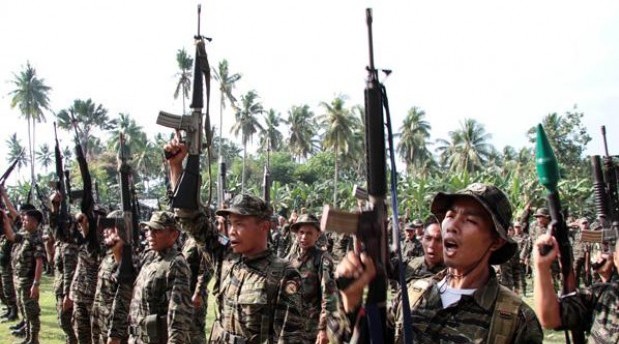
Moro Islamic Liberation Front. AFP FILE PHOTO
DAVAO CITY – Moro rebels have formalized their cooperation with the government’s anti-drugs campaign with the signing on Friday of an agreement on how to go about with anti-illegal drugs operations in areas under the insurgents’ influence.
Philippine Drug Enforcement Agency (PDEA) chief Isidro Lapeña said the protocol of cooperation on anti-illegal drug operations with the Moro Islamic Liberation Front (MILF) was a good manifestation to help in President Duterte’s campaign to rid the country of illegal drugs.
“There was an offer by the MILF to help (in anti-drug operations) in MILF-influenced areas so we have to involve them,” Lapeña said.
The signing between representatives of the government and the Moro rebel group came a year after the Duterte administration launched its illegal drugs crackdown which saw the seizure of tons of illegal drugs valued in the billions of pesos.
While existing mechanisms between the two sides through the Ad hoc Joint Action Group (AHJAG) have to be considered, Lapeña said the protocol on cooperation would take away some of the steps so anti-drug operations in MILF areas could proceed “more expeditiously.”
“What’s important here was the cooperation, the manifestation of support and assistance in the anti-illegal drug campaign which we appreciate very much,” the PDEA chief said.
He said the AHJAG mechanism, created to oversee the ongoing ceasefire agreement between the biggest Moro insurgent group in the country and the government, would be used in the conduct of operations to avoid miscommunication and miscoordination that might lead to violent incidents on the ground.
Undersecretary Catalino Cuy, officer-in-charge of the Department of the Interior and Local Government (DILG) said the protocol came about following a lengthy series of meetings between representatives of both sides, and that MILF-held areas have also been affected by the drug menace.
He said the Moro rebel group in 2015 has prohibited the use, sale and proliferation of illegal drugs in Bangsamoro areas, declaring the illegal substance as “haram” or forbidden in Islam.
“With the war on drugs declared by President Duterte and the MILF campaign against illegal drugs, (both parties) agreed to coordinate and cooperate in the campaign. The partnership aims to produce optimum result in the war on drugs,” Cuy, a retired police general, said.
An agreement of cooperation and coordination in anti-drugs operations in MILF-influenced communities was signed by representatives of both parties on July 2016, Cuy said.
He said another meeting was called which resulted to the drafting of an anti-illegal drugs protocol that would clearly define the roles of the government and the MILF in the conduct of anti-illegal drug activities.
“The commitment of the MILF in addressing the drug problem in their areas will greatly help the war on drugs. The support of the MILF just show that we could be one in our common goal of providing drug-free communities,” the DILG official said.
Lapeña said the MILF can also do anti-drugs activities in their areas like conducting “citizens arrests” against drug suspects who would then be handed to government authorities.
Lawyer Abdul Dataya, AHJAG representative for the MILF, said their role was limited to coordinating with government forces and furnishing of list of drug personalities in their area.
Asked if they would also take a direct part in anti-drug operations in communities under their influence, Dataya said: “We leave that to regular (government) forces. But the MILF will assist in trying to prevent possible a mis-encounter. We have a group who will coordinate with the Armed Forces.”
Chief Supt. Pierre Bucsit, AHJAG representative for the government, said the protocol would serve as a standard to be followed in anti-illegal drugs operations in MILF-influenced areas.
Dataya said the protocol would be applicable in MILF areas in the Autonomous Region in Muslim Mindanao (ARMM) and MILF camps in Central Mindanao, Western Mindanao and some parts of Davao Oriental and Compostela Valley, in Davao region.
In the ARMM, Lapeña said illegal drugs are rampant in 366 of Maguindanao’s 509 barangays (villages), or about 72 percent while Lanao del Sur, which includes Marawi has 313 of its 1, 059 villages or 29 percent, affected.